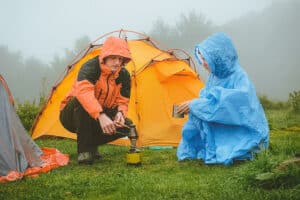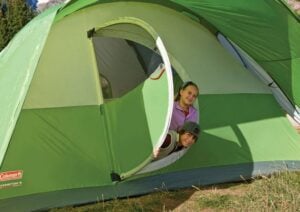If you’ve been camping for a while, by now you should know that the key to staying happy in the outdoors is having the right camping gear.
But like everything else, your tent needs care and maintenance too. It’s not just about putting it up once or twice per year; it’s about storing it correctly so that you can use it for years to come. In this post, we’re going to share 7 tips on how to store a tent correctly.
And while these are all good general guidelines for any type of tent (whether backpacking or family size), they’re especially important if you’re storing an expensive, high-quality tent.
So let’s get started!
How do you store a tent correctly for your next camping trip?
The key to storing your tent correctly is making sure that it’s protected from the elements and in a dry area. For easy carrying, keep it as flat as possible with all solid parts on the inside.
- A backpacking tent should be rolled up one to two times and stored untangled, laying over other gear like your sleeping bag, or standing on its own.
- Store a family-sized tent or permanent tent by unzipping the fly and folding it back. Roll the tent fabric from the bottom, with the tent poles on the inside. Zip the fly closed and secure it with straps.
Recheck every month for signs of wear and tear such as broken zippers, separations at zipper seams, or splits in the tent fabrics. Replace any worn patches before using them again!
Why is storing a tent important?
People who like camping should read this so they can store their tents in a good way and keep tents in good condition. This is important so they can avoid any headaches the next time they go camping.
How to store a tent so it lasts
When you’re not using it, it’s important to store it in a way that will keep it in good condition for years of outdoor use. Here are 7 tips on how to do just that:
1. Make sure your tent is clean and dry before storing it
The importance of making sure it’s clean and dry before storing it cannot be overstated. Not only will this help protect it from mold and mildew, but it will also help protect it from any damage that could be caused by insects or rodents.

2. If you’re storing a backpacking tent
Backpacking types are designed to be small and easy to carry, so the best way to store them is by rolling them up one to two times. Just make sure that you don’t wrap them too tightly or they could get damaged. You should also try to store them in an untangled state – this will help keep them organized and easy to find the next time you go camping.
3. For family-sized or permanent tents
If you’re storing a family-sized or permanent tent, unzip the fly and fold it back. Roll the fabric from the bottom, with the tent poles on the inside. Zip the fly closed and secure it with straps. make sure that you don’t wrap them too tightly or they could get damaged.
4. Check for wear and tear every month and replace any worn patches before using again.
It’s important to always check your tent for any signs of wear and tear before using it again. This includes separations at zipper seams and splits in fabric. If you notice any damage, be sure to replace the affected parts before using it again.
5. Store your tent in a dry place away from direct sunlight or moisture
The last thing you want is for it to get damaged from either moisture or sunlight. So make sure to store it in a dry area that’s away from both of these elements. A light coat of waterproof coating can also be helpful in preventing water damage. For more information on how to waterproof a tent, check out our 7 simple steps on waterproofing a tent.
6. Keep your tent zipped shut when not in use to protect it from animals or insects.
Insects and animals can be a real nuisance if they crawl in your sleeping bags, so it’s important to keep your tent zipped shut when not in use to protect it from them. This will help keep your tent in good condition for years of use.
7. If you have limited storage space, consider getting a storage tent bag
If you’re short on storage space, consider getting a storage bag designed specifically for tents. This will help keep it in good condition in a breathable bag while taking up minimal space.
Storing a tent for different occasions
The way you store your tent will vary depending on the type of tent you have and the occasion for which you plan to use it next. Here are a few general tips:
1. How to store a tent for next time
If you’re storing your whole tent for next time, make sure it’s clean and dry before putting it away. The last thing you want is a dirty tent to ruin your next trip. You should also try to store it in an untangled state – this will help keep it organized and easy to find the next time you go camping.
2. How to store a tent so it doesn’t get damaged
If you’re storing your tent so it doesn’t get damaged, make sure to check for any signs of wear and tear before using it again. This includes separations at zipper seams and splits in fabric. If you notice any damage, be sure to replace the affected parts before using your tent again.
3. How to store a tent for easy access the next time you go camping
If you are a frequent camper, it is a good idea to store your tent in an easily accessible spot. This will make set-up much faster and easier the next time you go camping. Try to find a spot in your garage or storage shed where the tent can hang or be placed in a vertical position. This will help keep the tent in good condition and make set-up a breeze.
4. How to store your tent for travel
If you’re storing your tent for travel, you’ll want to collapse it and fold it in the correct way. Here are the steps:
- Lay your tent out on a flat surface and remove the stakes, poles, and rain fly.
- Fold the tent in half lengthwise, making sure the doors are aligned.
- Fold the tent in half again, this time width-wise.
- Roll the tent up starting from the bottom, being careful to keep it in its folded state.
- Tie the rolled-up tent closed with some parachute cord or a piece of rope.
Now your tent is ready to go in your backpack or storage container! This will ensure that it’s easy to set up and take down when you reach your destination.
5. How to store your tent for long-term storage
If you’re not going to be using your tent for an extended period of time, it’s best to store it in a dry and cool place. Make sure to completely dry the tent before putting it away by airing it out in the sun or using a hairdryer. Once it’s completely dry, put it in a sealable storage bag or container.
6. How to store your tent in a small space
If you’re short on storage space, consider getting a storage bag designed specifically for tents. This will help keep your tent in good condition while taking up minimal space.
7. How to store your tent for the winter
If you’re storing your tent for the winter, make sure to take it apart and store the parts in a dry place. You should also consider putting the tent in a storage bag or container to protect it from the elements.
FAQ
Can I store tent outdoors?
It is not recommended to store your tent outdoors if you live in an area with extreme weather conditions. Outdoor storage can lead to the build-up of moisture and damage your tent over time. A better option is to find a dry and cool place to store it indoors.
Can I store my tent in my attic?
Yes, you can store your tent in your attic as long as it is in a dry environment. Make sure to check the tent for any signs of moisture damage before storing it and air it out in the sun if necessary.
Recap and Further Reading
Storing a tent for camping enthusiasts is no easy task. There are many ways to store them, and it will vary depending on the occasion of use or storage space you have available.
Regardless of which method you choose, make sure that your tent remains in good condition by checking for any signs of wear and tear before using it again. Keeping up with these simple tips should help ensure that your next camping trip goes smoothly!





